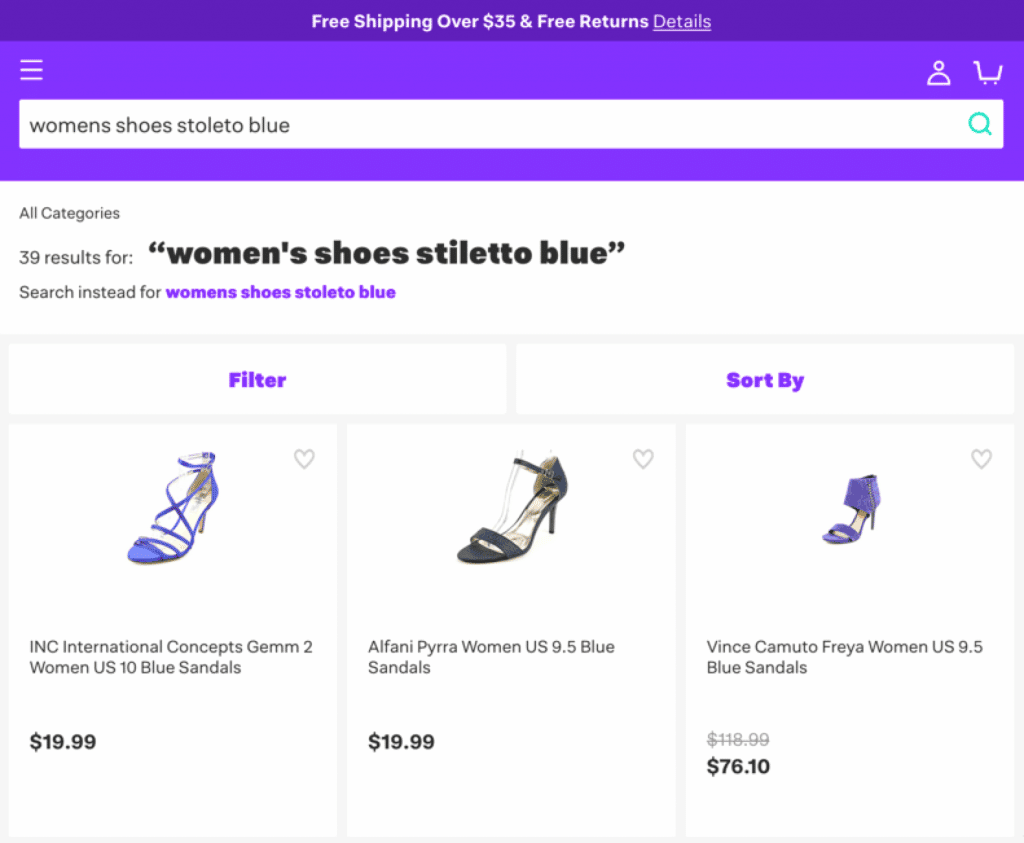Think about the difference between a mediocre and stellar search experience. What stands out?
A bad search engine will miss subtleties, show the wrong results, punish you for spelling or syntax errors, and even give you zero results.
A truly great search engine not only shows you relevant results, but also tries to understand who you are and what you are looking for, learning from your actions and providing a personalized search experience.
Legacy ecommerce search engines often still rely on basic keyword approaches that make shoppers work a lot harder to find what they are looking for. Subpar ecommerce search drives shoppers away from your site—and to competitors like Amazon where they know they will have a consistent experience.
What qualities do the best ecommerce search engines share?
An ecommerce search engine works best when it provides a personal, organic experience. Here are a few of the key building blocks all the best ecommerce search engines share:
Natural language search that understands customer intent
Natural language processing (NLP) enables search engines to move beyond presenting results that simply match query keywords, to presenting results that match on a query’s intent.
To provide a high-quality search experience, your customers need to find what they are looking for on their first try, even if their search has typos, unusual phrasing, or any number of other curveballs. If search returns poor results because of a misspelled word or a synonym, users don’t think they messed up—they think you just don’t have what they’re looking for and they go elsewhere.
Natural language processing (NLP) discovers the meaning behind your search, delivering a perfect result for an imperfect search.
Let’s take a look at an example. A customer that is shopping for “women’s blue shoes with 3 inch heels” might type something like “blue dress shoes women,” or if they aren’t paying the closest attention, “tree inch heals”.
A search engine that uses NLP will likely return similar first query results that are close to the customer’s intent. It will identify common synonyms and misspelled words, all without any merchandiser intervention. (No more manually adding synonyms!)
And even if you have the time and resources to painstakingly add synonyms and associations to your ecommerce site search, improvements are modest. Dramatic improvements in search accuracy don’t come from adding manual bandaids. They require a fresh approach using NLP and AI-based product search platforms.

Site search that’s based on business goals
NLP helps understand customer intent to find the best set of products, but that set of products can often be huge, especially when the search query is broad. Additional processing is required to present the results to the customer in the rank order most likely to lead to the desired outcome (a purchase!).
The legacy approach to results ranking is semantic relevance and algorithms like TF-IDF: exact keyword matches rank first weighted by how “important” a keyword seems using something like TF-IDF or BM25. Relevance scoring uses things like word count and proximity heuristics to rank results. Merchandising staff is then tasked with manually overriding cases where the automatic relevance goes terribly wrong, guessing at user intent with little information on actual conversion outcomes.
Krestor believes that business strategy, not your search vendor’s out-of-the-box algorithm, should determine the way your products rank. Conversion rate, gross margin, customer loyalty, recent search terms, or a utility function taking multiple values into account makes the search experience more valuable to customers and the business alike.
Personalized search results
True personalization goes beyond ranking results based on business KPIs or goals, and provides results that are optimized to a specific user. Like results ranking described above, big data and machine learning are essential to performing personalization at scale.
Shoppers and merchants have always valued personalized experiences, but true ecommerce personalization is new. Sites that create these personalized experiences are going to wow their users, and are better equipped to drive customer loyalty and revenue.
This type of personalization is able to get information about each customer based on the actions they take on your website and seamlessly use this to create a better experience.
Learning about your customers and adjusting their experience can have dramatic impacts on conversion rates. For example, a shopper using the search term “coat” in the winter in New York benefits from seeing a different set of recommendations than a shopper running that same search during the summer in Sydney. Likewise, a shopper who has demonstrated they click on organic products on your site should see organic selections featured in future search results.

What ecommerce search engines are there?
Most legacy site search engines (and many SaaS search offerings) are built on Lucene, an open-source search algorithm built over 20 years ago. Lucene attempts to give relevant results by matching keywords in a search query to keywords in its result database.
This is ancient technology akin to rubbing two sticks together to make a fire. Yet many huge retailers still rely on this outdated technology to show the right products to their customers, losing millions in revenue in the process.
Like Lucene, many search products on the market (such as Algolia, Bloomreach, and many others) use this relevance-based approach at the core of their offering. But while offering better optimization of relevance-based search can give small improvements, it leaves significant opportunities for conversion and revenue growth overlooked.
And to make it worse, these platforms aren’t built with ecommerce in mind. They don’t optimize for KPIs or offer true hyper-personalization.
What makes Krestor different?
Created from the ground up on AI technology, Krestor is built to provide the best online product search and discovery available. Unlike our competitors, Krestor is built just for ecommerce, letting our customers optimize for the business KPIs that matter most.
Don’t just trust us.
Make us prove it.
Let us quantify the value of Krestor’s product search and discovery on your site, using your data.
